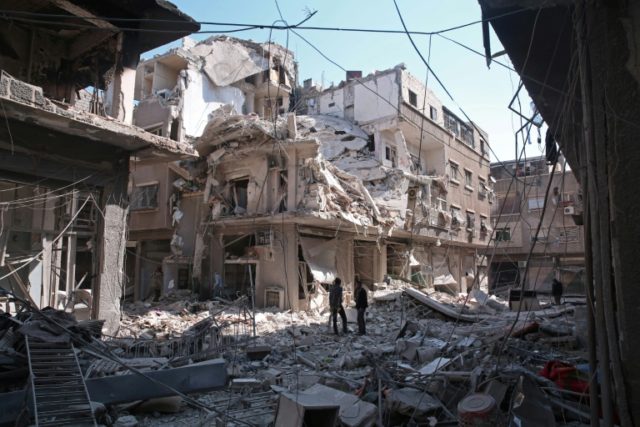Geneva (AFP) – The UN sought painstakingly Friday to get a new round of Syrian peace talks off the ground, but there were few signs of progress as dozens more civilian deaths underlined the scale of the challenge.
The UN’s Syria envoy Staffan de Mistura, who brought rival regime and opposition delegates symbolically together late Thursday, held separate meetings with them Friday to hammer out the format for the meetings.
But there appeared to be no discussion of substance, either with the UN and certainly not between the rival parties themselves.
“We discussed issues relating to the format of the talks exclusively,” said Syrian regime delegation chief Bashar al-Jaafari after meeting de Mistura.
“We are going to talk about procedure,” a member of the opposition delegation, Assad Hana, told AFP before an afternoon meeting with the UN envoy.
UN Secretary General Antonio Guterres said he was “encouraged that the Syrians … sat together in the same room,” even if it remains unclear whether the two sides will hold face-to-face negotiations.
During three previous rounds of talks in Geneva last year, the rivals never sat down at the same table, instead leaving de Mistura to shuttle between them.
– Over 300,000 dead –
Even as the new UN talks began, the death toll in a suicide bombing near the Syrian town of Al-Bab rose to 51, the latest atrocity in a six-year war which has killed more than 310,000 people.
In addition two Turkish soldiers were killed, while separately officials in Baghdad said the Iraqi air force struck members of the Islamic State (IS) group in neighbouring Syria.
In Al-Bab most of the dead were Turkish-backed rebels, who had only just taken the stronghold town from IS militants.
There was no immediate claim for the attack but it bore all the hallmarks of IS, which had put up fierce resistance in Al-Bab for weeks.
The attack has no direct bearing on the UN talks, since the IS is not part of the latest ceasefire deal, but it illustrates the lack of any return to normality for war-ravaged Syria.
In Geneva, de Mistura — hosting the first UN-sponsored talks since April — acknowledged the frailty of the latest ceasefire, which was agreed in late December.
– ‘Fragile’ ceasefire –
The ceasefire “is fragile but it is there, and we didn’t have one for many months,” he said late Thursday.
In his welcoming address, the veteran diplomat called on the war-torn nation’s rival sides to meet their historic responsibility.
But he played down hopes of a breakthrough.
“I’m not expecting miracles,” he admitted while warning of dire consequences if the talks “fail again”.
The talks between negotiators for Syrian President Bashar al-Assad and the opposition have been clouded by persistent violence and deadlock over the country’s political future.
The main opposition High Negotiations Committee (HNC) has said it wants to meet the government face-to-face.
Two other opposition groups based in Moscow and Cairo, who are also in the Swiss city, want a seat at the table but the HNC has insisted it should remain the only rebel delegation.
The rebels are in a significantly weaker position since the last UN-sponsored round.
The army has recaptured the rebel bastion of eastern Aleppo and Washington, once staunchly opposed to Assad, has said it is reassessing every aspect of its Syria policy under President Donald Trump.
– Syrian ‘transition’ disputed –
The regime delegation chief said Friday that De Mistura had given them a “paper” — which according to a source close to the talks covers three areas for discussion: transition in Syria, a constitution and elections.
Political “transition”, which is part of UN Security Council Resolution 2254 which managed the Geneva talks, is at the heart of the debate.
But it has different meanings for Damascus and its Russian and Iranian allies on side, and the Syrian opposition on the other.
“As the Russians and the regime see it, a government of national unity is put in place, Bashar al-Assad remains president and they bring in opposition who will look after hunting and sports.
“For the opposition, it’s clear that the Syrian president cannot remain in power,” said a western diplomatic source.

COMMENTS
Please let us know if you're having issues with commenting.